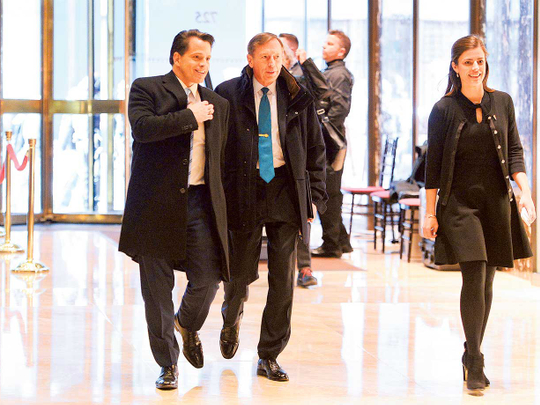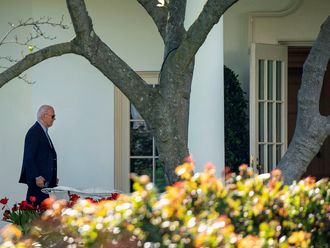
Washington: President-elect Donald Trump met on Monday with David H. Petraeus, the highly decorated but scandal-scarred former military commander, who has emerged as a new contender for secretary of state after days of bitter internal feuding over who will get the coveted post.
Petraeus, a retired general and former CIA director, spent an hour with Trump at his offices in Trump Tower in Manhattan and told reporters afterward that the president-elect had given him a tutorial on world affairs.
“He basically walked us around the world,” Petraeus said. “Showed a great grasp of a variety of the challenges that are out there and some of the opportunities as well. Very good conversation, and we’ll see where it goes from here.” In a Twitter post 15 minutes later, Trump said, “Just met with Gen. Petraeus — was very impressed!”
Also on Monday, a transition team official said that Trump had selected Rep. Tom Price, an orthopaedic surgeon and six-term Republican congressman from Georgia who has led opposition to the Affordable Care Act, to be secretary of health and human services.
Trump spent the day in back-to-back meetings after a quiet Thanksgiving weekend at his Mar-a-Lago estate in Palm Beach, Florida. In addition to seeing Petraeus, he met with Frances Fragos Townsend, a homeland security official in the Bush administration, and with David A. Clarke Jr., the tough-talking Milwaukee County sheriff. Both are candidates for secretary of homeland security.
As he was leaving Trump Tower on Monday, Vice President-elect Mike Pence said, “There will be a number of very important announcements tomorrow.”
Trump has already conferred with the other two leading candidates for the State Department post: Mitt Romney, the former Massachusetts governor and 2012 Republican presidential nominee, and Rudolph Giuliani, a former New York City mayor. He was scheduled to meet Romney again for dinner on Tuesday.
But Trump’s deliberations have become bogged down, with people in his camp deeply divided over whether he should choose Giuliani, a steadfast loyalist with a record of problematic business dealings, or Romney, an establishment figure who denounced him during the campaign and has been publicly opposed by some of Trump’s closest advisers.
Petraeus, 64, has his own black mark: He was prosecuted for mishandling classified material in a scandal stemming from an extramarital affair with his biographer. During the relationship, he turned over his confidential diary to the biographer, Paula Broadwell, leading the FBI to recommend that he be charged with a felony. He pleaded guilty to a misdemeanour.
If he is nominated, that could raise hurdles for Petraeus with Democrats and even some Republicans at his Senate confirmation hearing. It could also prompt the intelligence agencies to recommend against giving him a security clearance, though legal experts said the president could override that.
At a minimum, it would open Trump to charges of hypocrisy. He made Hillary Clinton’s handling of classified information, through her use of a private email address and computer server, the centrepiece of his attacks on her character and trustworthiness. The director of the FBI, James B. Comey, has said that Petraeus’ transgressions were more serious than Clinton’s.
“The Petraeus case was a classic security breach that rightly resulted in criminal action,” said Richard W. Painter, the chief White House ethics lawyer from 2005 to 2007. “It just reeks of hypocrisy.”
Steven Aftergood, who directs the project on government secrecy at the Federation of American Scientists, said, “It suggests that much of the campaign hoopla directed against Hillary Clinton by Mr. Trump was manufactured, and not sincere.” But he added: “I don’t think it’s a fatal flaw. One could imagine more problematic candidates.”
Ethics officials who worked in the Obama administration agreed. Norman L. Eisen, who served as President Barack Obama’s ethics counsel during his transition and at the White House, said he believed that Petraeus had paid a price for his misdeeds and deserved a second chance.
“I do believe that at the career level, there would be reservations,” Eisen said. “But at the policymaker level, there will be a judgement that if the president deems it worthy, he should get the clearances he needs. My own judgement, for what it’s worth, is that I would support it.”
Petraeus, whose friends said he was eager for the job, would bring obvious qualifications to the State Department. He is a politically astute military commander with experience in Iraq and Afghanistan, two conflicts that will immediately confront the new president, as well as a Ph.D. in international relations from Princeton. His CIA experience gave him broad exposure to America’s clandestine operations.
Gen. Jack Keane, a former Army vice chief of staff, said he had recommended Petraeus to Trump in a meeting two weeks ago, when Trump was sounding Keane out for the job of defence secretary. Keane was a mentor to Petraeus, and saved his life in 1991 when Petraeus was shot accidentally during a live-fire exercise.
“He has an extraordinary portfolio, having run two theatres of war and directed the Central Intelligence Agency,” Keane said. “That level of experience would be invaluable to the president, given the fact that he is a strategic thinker, is well-versed on the issues of the day, and has an amazing network of heads of state and foreign and defence ministers.”
Petraeus is still frequently cited for his work as the editor of “The US Army/Marine Corps Counterinsurgency Field Manual,” which laid out the troop-intensive strategy used by Bush in Iraq and Obama in Afghanistan. During the presidential campaign, Trump opposed such intensive American engagement and said the United States should stop nation-building overseas.












